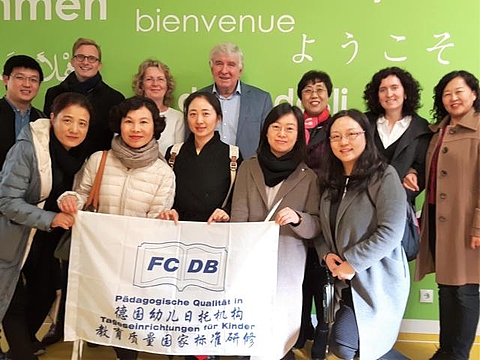International Exchange in Berlin
Professor Wolfgang Tietze, editor of the National Catalog of Criteria for Pedagogical Quality in Daycare Facilities, presented FRÖBEL in the framework of a workshop as an innovative and international provider of early childhood education.
When Professor Dr. Wolfgang Tietze was approaching us, asking to host a group of Early Childhood Professionals, FRÖBEL happily agreed. A group of Chinese Early Childhood Leaders and Research Assistants had booked a trainee with PädQUIS, learning about the National Quality Area Assessment for internal evaluation, with main focus on the learning environment as the third educator. The group was curious to visit a German kindergarten, and it was important for Professor Tietze to introduce FRÖBEL as an innovative provider for Early Childhood Education.
When visiting the FRÖBEL-Kindergarten Kleine Füße-Nasweis, Ms Angelika John was giving the group of eight Chinese Early Childhood Professionals, Mr Lu and Professor Tietze a tour throughout the building. When showing the group around, Angelika John was focusing on introducing the concept of Open Pedagogic and its influence on furnishing the rooms and its availability for children. One focus was the right for children to independently choosing rooms and activities offered by different educators. This led to an interesting discussion about the educator’s role as well as differences in working with children within different structures, for example Open Pedagogic or forming groups of children. Together with Professor Tietze we could answer questions about Friedrich Fröbel, his philosophy in children’s learning prior primary school and its concept of the institution Kindergarten.
After visiting the kindergarten, the group was traveling to “teacher’s house”, where FRÖBEL is based. Theresia Wollnitz was introducing the provider FRÖBEL, when explaining our connection to Friedrich Fröbel, FRÖBELs Pedagogical Framework, but also the different offices to assist our Kindergartens, for example professional trainings, assessment and rating processes etc. Furthermore, we could introduce and discuss some ideas and examples of room concepts at FRÖBEL Early Childhood Settings.
Questions asked the most were:
- What does “Open Pedagogic” mean?
- How much decisions children allowed to make?
- How do educators make sure children learn if the individual child decides about his/her activity?
- What is the educators’ role?
- How satisfied are parents with Open Pedagogy?
We were grateful to discuss these questions with the group. It made us realize that always both parties are able to learn from each other. We would like to further develop our concept to make our philosophy accessible for people with different professional and/or cultural backgrounds.
Many thanks to Ms Angelia John for inviting us in her kindergarten and to professor Tietze who included FRÖBEL in this international Early Childhood Professional exchange.
